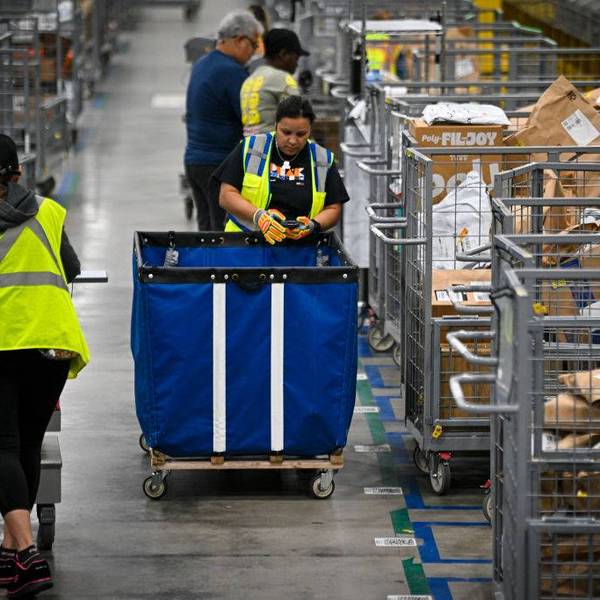The U.S. Department of Labor said Thursday that 419,000 people filed for unemployment benefits last week, an increase that came after more than two dozen Republican-led states ended their participation in federal jobless programs enacted to help workers stay afloat amid the coronavirus crisis.
According to the Labor Department's data (pdf), unemployment claims last week were up 51,000 from the previous week, an indication that layoffs are continuing as the ultra-contagious Delta variant of the coronavirus spreads rapidly across the nation.
"Cutting UI benefits is not leading to more employment."
--William Spriggs, AFL-CIO
Andrew Stettner, a senior fellow at the Century Foundation, said the new figures show "how far we still have to go in our economic recovery--and the danger of the coming [unemployment insurance] cut-offs and impact of the Delta variant."
"Already, more than three million workers have seen their federal UI benefits cut off early," Stettner noted. "So far, data has flatly rejected the hypothesis that these workers would move quickly to open jobs... Over the last month, claims for state benefits actually fell faster in states that kept the $300 (-4.3%) than they did in states that had eliminated the extra aid by July 3 (-3.9%)."
Overall, 26 states have announced plans to cut off federal jobless programs designed to boost weekly benefits by $300, extend benefits for the long-term unemployed, and provide aid to gig workers and others who are typically ineligible for state benefits. Louisiana, which is ending its participation in the programs on July 31, is the only Democratic-led state to cut off the federal aid.
Louisiana Gov. John Bel Edwards agreed to terminate the $300-per-week federal boost in exchange for increasing the maximum state unemployment benefit by $28--to $275 a week.
The end of the $300 weekly boost in 26 states means that residents currently on unemployment aid and those seeking the benefits will be forced to get by on often paltry state-level payments, impacting their ability to afford food, medicine, and other basic necessities.
With the Biden administration refusing to act, jobless residents of several states--including Tennessee, Texas, Ohio, and Oklahoma--are suing their governments demanding the reinstatement of the federal unemployment aid. In recent days, judges in Indiana and Maryland have ordered the GOP-controlled state governments to continue distributing the benefits.
Republican leaders have justified cutting off the federal programs before their official September expiration by claiming that federal jobless benefits were holding back hiring. Once the benefits are terminated, the narrative goes, people forced off unemployment should return to the workforce.
Economists have disputed the GOP narrative as baseless, given the myriad other factors preventing people from going back to work--from the low wages on offer to lack of child care.
While Republican governors have succeeded in pushing people off unemployment benefits, new research indicates that they've yet to see the promised hiring boost.
"Overall, the mid-June expirations of pandemic UI seem to have sharply reduced the share of population receiving any unemployment benefits," Arindrajit Dube, professor of economics at the University of Massachusetts Amherst, wrote in an analysis last week. "But this doesn't seem to have translated into most of these individuals having jobs in the first 2-3 weeks following expiration."
"However," Dube added, "there is evidence that the reduced UI benefits increased self-reported hardship in paying for regular expenses."
Pointing to Dube's findings, AFL-CIO chief economist William Spriggs tweeted that Republican governors' termination of federal jobless benefits have resulted in "all pain and no gain" for unemployed workers.
"Cutting UI benefits is not leading to more employment," Spriggs wrote in a separate tweet, citing the new Labor Department figures.
As The Daily Poster reported Thursday, jobless workers warned of such an outcome in angry, desperate emails to Republican governors as they moved to end the federal aid.
"By you choosing to end the federal programs early, you are going to cause those of us who truly need this money to end up penniless because we cannot take restaurant jobs getting only 15 [hours] a week with no benefits and min[imum] wage pay!" one West Virginia resident wrote to Republican Gov. Jim Justice in mid-May.
"I am in kidney failure and when Covid hit my self-employment took a huge hit, and because of my illness I cannot subject myself to working out in the public," she added. "I have been trying to find a work-from-home job and haven't been able to."




